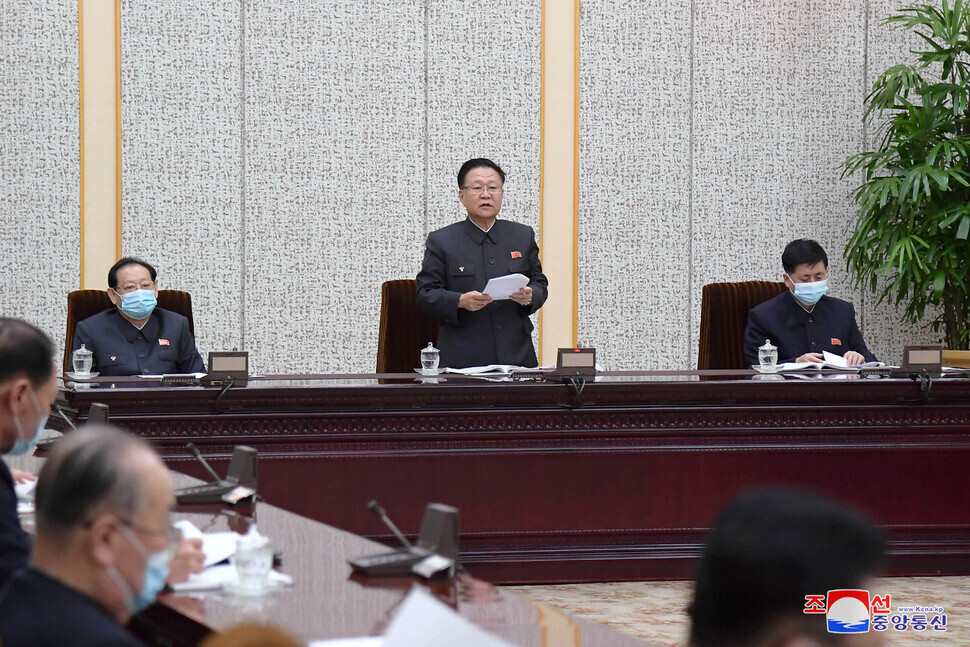hankyoreh
Links to other country sites 다른 나라 사이트 링크
How will N. Korea’s new anti-smoking legislation affect avid smoker Kim Jong-un?

North Korea’s Supreme People’s Assembly (SPA) held the 11th plenary meeting of its 14th Presidium on Nov. 4, where it decided to adopt a tobacco prohibition law and revise and supplement (amend) its enterprise law, the Rodong Sinmun reported in a front-page story on Nov. 5.
The “tobacco-prohibition law with 31 provisions” adopted at the meeting, which took place at the Mansudae Assembly Hall with SPA Presidium President Choe Ryong-hae presiding, was stated as having the aims of “tightening the legal and social controls” on tobacco, “protecting the lives and health of the people,” and “providing more cultured and hygienic living environments.”
“The law specifies places and units in which smoking is forbidden, such as places for political and ideological education, public places including theaters and cinemas, and the institutions for nursing and upbringing children, education ones, medical and public health facilities, commercial and public catering ones, [and] public transport means,” the article said, adding that it “indicates penalties for violating smoking rules.” This indicates that people will be punished for smoking in public settings such as movie theaters, restaurants, and hospitals and on public transportation.
Many are watching to see what changes this will mean for leader Kim Jong-un, who has often been shown in the Rodong Sinmun, on Korea Central Television, and in other media smoking a cigarette while conducting on-the-spot guidance and presiding over meetings.
The amendments to the enterprise act are intended to “mak[e] enterprises labor-, energy-, cost-, and land-saving,” stipulating “issues which all the units must observe when organizing new enterprises or when their affiliations change.” This signals that enterprises are to be categorized and operated in accordance with the strategic aim of “achieving a full-scale breakthrough through self-reliance,” with tighter controls in connection with enterprise management.
By Lee Je-hun, senior staff writer
Please direct comments or questions to [english@hani.co.kr]

Editorial・opinion
![[Column] Tariffs on China: Trump was dumb, Biden dumber [Column] Tariffs on China: Trump was dumb, Biden dumber](https://flexible.img.hani.co.kr/flexible/normal/500/300/imgdb/original/2024/0520/191716191153918.jpg) [Column] Tariffs on China: Trump was dumb, Biden dumber
[Column] Tariffs on China: Trump was dumb, Biden dumber![[Column] What if Seoul took reunification by force off the table? [Column] What if Seoul took reunification by force off the table?](https://flexible.img.hani.co.kr/flexible/normal/500/300/imgdb/original/2024/0520/3017161928630494.jpg) [Column] What if Seoul took reunification by force off the table?
[Column] What if Seoul took reunification by force off the table?- [Editorial] Intensifying US-China rivalry means Seoul must address uncertainty with Beijing sooner than later
- [Column] When ‘fairness’ means hate and violence
- [Editorial] Yoon must stop abusing authority to shield himself from investigation
- [Column] US troop withdrawal from Korea could be the Acheson Line all over
- [Column] How to win back readers who’ve turned to YouTube for news
- [Column] Welcome to the president’s pity party
- [Editorial] Korea must respond firmly to Japan’s attempt to usurp Line
- [Editorial] Transfers of prosecutors investigating Korea’s first lady send chilling message
Most viewed articles
- 1To weigh costs and benefits, Korea must stop treating US troop presence as a sacred cow
- 2Xi, Putin ‘oppose acts of military intimidation’ against N. Korea by US in joint statement
- 3Kim Jong-un wanted to meet with residents of shelled Yeonpyeong Island in South, Moon recalls in mem
- 4[Column] What if Seoul took reunification by force off the table?
- 5[Editorial] Transfers of prosecutors investigating Korea’s first lady send chilling message
- 6Berlin mayor hints at tearing down ‘comfort women’ memorial in city
- 7[Column] US troop withdrawal from Korea could be the Acheson Line all over
- 8Thai police find body of missing Korean man stuffed in barrel and dumped in reservoir
- 9[Editorial] Korea must respond firmly to Japan’s attempt to usurp Line
- 10For new generation of Chinese artists, discontent is disobedience